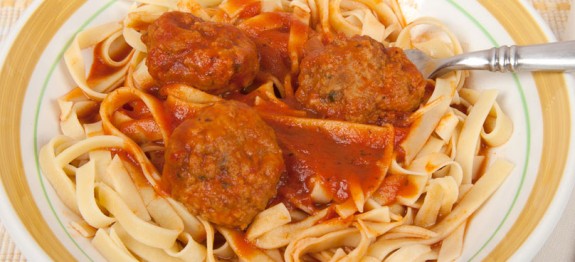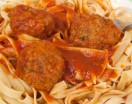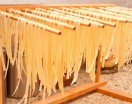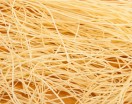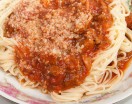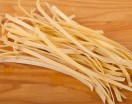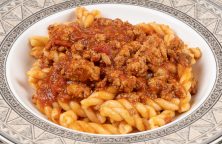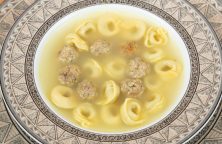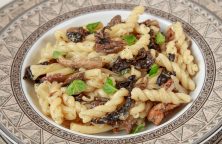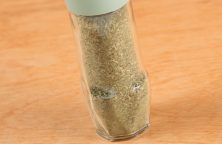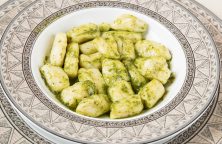Homemade Egg Pasta
2013-08-16- Cuisine: Italian, Mediterranean, Southern Italian
- Course: Pasta & Rice
- Skill Level: Moderate to Difficult
- Yield : About 10 oz. (300 g)
- Servings : 4
- Prep Time : 50m
- Cook Time : 6m
- Ready In : 60m
Related Recipes:
Nutritional Info
This information is per serving.
-
Calories
330 -
Calories from Fat
40 -
Total Fat
4g -
Saturated Fat
1g -
Trans Fat
0g -
Cholesterol
160mg -
Sodium
55mg -
Carbohydrates
54g -
Dietary Fiber
2g -
Sugar
0g -
Protein
12g -
Serving Size:
About 3 oz. (75g) dried
Unlike store bought dried pasta made from semolina and water, homemade egg pasta is made with all-purpose flour, eggs and if necessary a little water. It’s texture is more like egg noodles and the flavor is better than most supermarket fresh pastas.
While dried pasta has no cholesterol and very low sodium, homemade pasta has about 160 mg of cholesterol and 54 mg of sodium from the eggs. There is no added salt. You can add salt to the cooking water if desired.
You can use this recipe to make pasta sheets for lasagna or ravioli, fettuccine and spaghetti if using a pasta machine to cut the sheets. You can also cut the pasta using a knife to make tagliatelle and other long pastas.
Although you can knead, roll out, and cut the dough by hand, a pasta machine (picture below) simplifies the process especially if you find yourself making lots of homemade pastas.
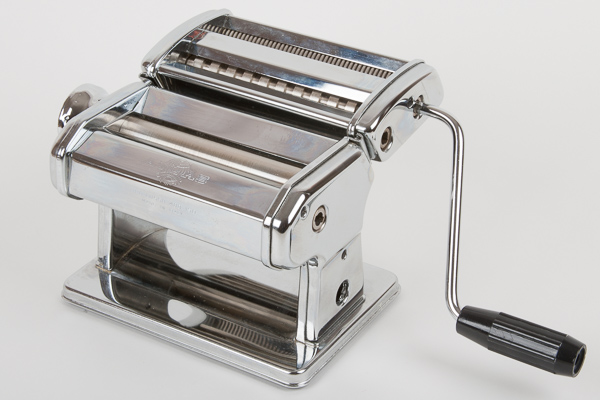
Cook’s Tip
Pasta can be stored for several weeks or months without refrigeration. Dry completely and store, covered with paper towels or in an air tight container in a cool dry place.
Nutrition Information
Nutrition information is based on 3 large eggs.
Ingredients
- Hand Mixing
- 2 cups (300 g) all-purpose flour (unbleached preferred)
- 2 to 3 large eggs
- 2 to 6 tablespoons (30-90 ml) room temperature water
- Flour for dusting
- Food Processor Mixing
- 2 cups (300 g) all-purpose flour (unbleached preferred)
- 2 large eggs
- 2 to 3 tablespoons (30-45 ml) room temperature water
Method of Preparation
Step 1
Hand Mixing & Kneading. See Step 17 for Food Processor Method
Step 2
Place the flour on a clean, flat work surface and make a well in the middle.
Step 3
Break the eggs into the well. Use a fork to beat the eggs until uniform in color and then begin incorporating flour into the beaten eggs.
Step 4
After incorporating more than half the flour into the eggs, use your hands to knead the dough. Add water one tablespoon at a time to form a stiff dough. Cover with plastic wrap and let it rest 15 minutes.
Step 5
If you do not have a pasta machine, knead the dough by hand about 10 minutes until or until smooth and elastic. Cover with plastic wrap and let it rest 15 minutes.
Step 6
Kneading Using Pasta Machine
Step 7
Set the rollers to the widest setting. Cut off a piece of dough keeping the remaining dough covered to prevent drying. Flatten it into a disk and feed through the rollers. Fold dough in half and feed through 7 or 8 times or until smooth repeating the folding step. If the dough sticks dust with a little flour.
Step 8
Adjust the roller to the next smallest setting and feed the dough through once. Repeat until dough is desired thickness. Dust with flour if necessary to prevent sticking.
Step 9
Cut the pasta into noodles or spaghetti and hang to dry on a clean wooden rod, broom handle or pasta drying rack. You can also spread the pasta onto wire racks to dry. Dry about 15 minutes before cooking.
Step 10
Repeat with remaining dough.
Step 11
Hand Rolling & Cutting
Step 12
Cut dough into 4 pieces. Cover dough you are not working with to prevent drying.
Step 13
Lightly flour work surface if dough sticks. Pat dough into a disk and use a rolling pin to roll out to about 1/16-inch thick.
Step 14
Place dough on a lightly floured towel and dry 20 to 30 minutes or until dry enough to cut. Do not over dry or dough will crack.
Step 15
Roll out remaining dough.
Step 16
For fettuccine or other long pasta, fold the dough into a flat roll about 4 inches wide. Use a sharp knife to slice about 1/8 to 1/4 inch wide. Adjust width if desired. After cutting open the pasta air dry about 5 minutes before coking. Repeat with remaining dough.
Step 17
Food Processor Method
Step 18
Place flour and eggs in processor bowl and process 10 to 15 seconds or until mixture resembles fresh bread crumbs.
Step 19
Add 2 tablespoons (30 ml) of water and process about 10 seconds. Mixture should resemble wet sand and hold together when pinched. If mixture is dry add 1 tablespoon of water and process about 10 seconds. If dough forms a ball, you've added too much water.
Step 20
Turn flour mixture out onto your work surface and use your hands to lightly knead and form a ball. Cover with plastic wrap and rest 10 to 15 minutes.
Step 21
Knead and cut per Step 6 for pasta machine.
Step 22
Cooking Homemade Pasta
Step 23
Bring 4 qt/l of water to a rapid boil. Add a tablespoon (15 ml) of salt if desired. Add pasta and stir to separate. Cook 2 to 5 minutes for fresh pasta and 5 to 8 minutes for dried pasta or until al dente. Cooking time will vary with pasta thickness.


